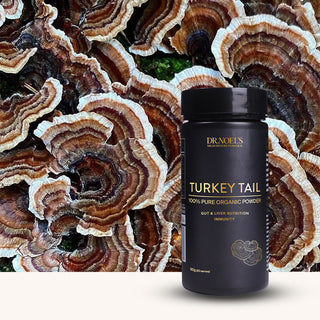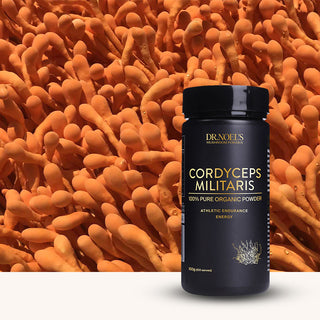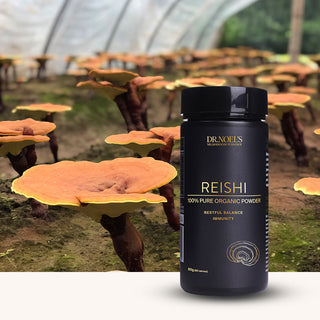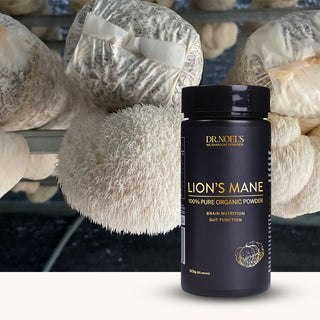Candida is a yeast-like fungus that is the source of the fungal infection known as candidiasis. People can become infected by many types of Candida; however, Candida albicans is the most prevalent. The fungus typically lives in harmony on the skin and inside the body, including the throat, mouth, gut, and vagina, without causing issues. If it spreads rapidly or enters deep into the body, it might become infectious.
Candida infection is more prevalent in infancy and old age. However, it may commonly infect women, too. Vulvovaginal candidiasis (VVC) affects between 30 and 50 percent of women at some point in their lives.
Turkey tail mushrooms can help with Candida. This is because they have anti-fungal properties.

Below is the scientific research that can back this claim.
Understanding The Research Behind Turkey Tail For Candida
Turkey tail mushroom has been utilized for centuries, particularly in traditional Chinese and Japanese medicine, partly because of its antibacterial properties. Some of the active components in these mushrooms modify or enhance immunological processes that have anti-fungal effects, including anti-yeast actions against Candida.
Turkey Tail Has Anti-Candida Effects
Although Turkey tail mushroom is a fungus, it can also demonstrate anti-fungal activities against selected Candida species. In a 2018 study from Serbia, the anti-fungal potentials of selected Turkey tail extracts were assessed for clinical strains of selected Candida species.
Studied extracts showed the anti-fungal potential of the mushroom, albeit low in comparison with the drug ketoconazole. The results suggest that the tested Turkey tail species have significant medicinal potential as anti-fungal drugs.
Benefits Of Turkey Tail Mushroom
Traditional Chinese Medicine practitioners have used turkey tail, also known as Trametes versicolor or Coriolus versicolor, for centuries as an immunomodulator to support immune function and fight infections. This functional mushroom’s unique and long-recognized significance among traditional medicine practitioners is its capacity to enhance the health of both an underactive and hyperactive immune system.
Turkey tail is one of the medicinal mushrooms that has been the subject of the most research. In particular, its strong natural polysaccharides, such as polysaccharide K (PSK) and polysaccharide peptide (PSP), are well-known. These polysaccharides linked to proteins help promote a strong and healthy immune response.
Additionally, Turkey tail has various naturally occurring compounds that support intestinal health and improve stamina, all of which are linked to a robust immune system. It contains potent flavonoids and more than 35 phenols, which are all abundant in antioxidants. They encourage a healthy immune system by triggering the release of immune-supporting substances.
The several notable Turkey tail mushroom compounds are:
Polysaccharides, particularly PSK and PSP: Support a healthy gut flora and the immunological barrier, which helps the immune system fight diseases.
Protein-bound beta-glucans: They may help prevent obesity by promoting the gut flora.
Phenols and flavonoids: Protect tissues from oxidative stress, which can damage them and lead to chronic diseases and early aging.
Because not all Turkey tail mushrooms are created equal, it is crucial to note that choosing a high-quality Turkey Tail powder supplement rather than a low-quality one is the only way to get these benefits. Although the FDA regulates the health supplement industry, the regulations are not consistently followed, and there is a staggering quantity of false information on product labels and in marketing materials.
Here are a few things to look out for to get the most out of Turkey tail products:
When choosing a mushroom supplement, look for one with a 100% fruit body. This is crucial because supplement makers might add some mycelium and the other substrate that the mycelium was grown on if it is not 100% fruiting body. Choose products with statements like “100% fruit body” or “no mycelium on grain” on the label.
The second thing to check is whether the amount of beta-glucans is stated on the product’s back. The beta-glucan content is a crucial factor to consider when looking for the best Turkey Tail supplement for various reasons.
First, it shows that a company tests its goods because there is no reliable way to measure beta-glucan levels without product testing. In addition, it informs customers of the product’s precise beta-glucan content, enabling them to choose the most potent option with complete understanding.
FAQs About Anti-Candida Effects Of Turkey Tail
Is Turkey Tail Mushroom Antibacterial?
Turkey tail mushrooms have been demonstrated to have antiviral and antibacterial effects in vitro, in addition to being a powerful anti-fungal agent. This indicates that they have a beneficial effect on bacteria and viruses in test tube studies.
What Happens If You Take Too Much Turkey Tail Mushroom For Treating Candia?
Most people who consume Turkey tail mushrooms or use them as supplements do so without experiencing any adverse side effects, even in large quantities. However, gastrointestinal problems like constipation, gas, bloating, nausea, and stomach discomfort have been noted as side effects.
What Is The Dosage Of Turkey Tail Mushroom For Candida?
Experts and academics advise consuming 2,000 milligrams (or 2 grams) of turkey tail mushrooms daily for optimal health. A healthy maintenance dose of two grams daily supplies enough beta-glucan polysaccharides to trigger an immunological response and enhance and balance your body’s natural immune system to fight candida infections.
What Makes Turkey Tail Mushrooms Beneficial To Health?
In addition to polysaccharides, antioxidants, prebiotic dietary fibers, sterols, peptides, triterpenes, and minerals, Turkey tail mushrooms also contain various other nutrients. These promote immunological function and help maintain general well-being and vitality.
How To Incorporate Turkey Tail Mushrooms Into A Healthy Lifestyle?
Use certified organic mushroom supplements, drink mixes, powders, and broths to easily add whole food sources of Turkey tail mushrooms to a healthy lifestyle. The body may take up to three weeks to start experiencing the health benefits for new Turkey tail mushroom users.
Conclusion
Researchers have found that Turkey tail mushrooms have anti-fungal properties, which may be effective against Candida infections. This makes the mushroom a potential supplemental therapeutic agent for Candida. Speaking with a healthcare provider or a holistic expert before using Turkey tail mushrooms is best.
References
1. Current medical mycology. Prevalence of vulvovaginal candidiasis in gynecological practices in Germany: A retrospective study of 954,186 patients.
2. PloS one. Antioxidative, antifungal, cytotoxic and antineurodegenerative activity of selected Trametes species from Serbia.





